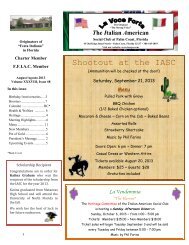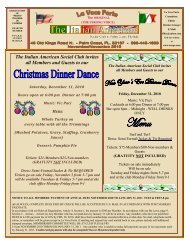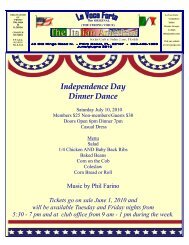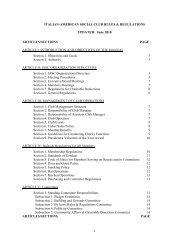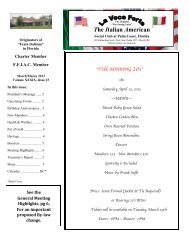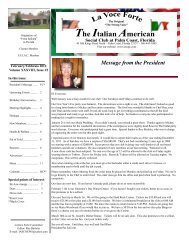The Italian American Social Club at Palm Coast message - IASC
The Italian American Social Club at Palm Coast message - IASC
The Italian American Social Club at Palm Coast message - IASC
Create successful ePaper yourself
Turn your PDF publications into a flip-book with our unique Google optimized e-Paper software.
HERITAGE COMMITTEE<br />
ENRICO FERMI<br />
Enrico (September 29, 1901- November 28, 1954) is a famous <strong>Italian</strong> physicist mainly known for his work on the development of the first<br />
nuclear reactor called the Chicago Pile-1. He contributed significantly to the development of Quantum theory, nuclear and particle physics, and st<strong>at</strong>istical<br />
mechanics. In 1938, he received the Nobel Prize for his work on induced radioactivity. Enrico was a leading scientist of the 20th century along with J.<br />
Robert Oppenheimer. <strong>The</strong>se two are considered the “F<strong>at</strong>hers” of the <strong>at</strong>omic bomb.<br />
Enrico for his significant works received several awards over the years. Awards and institutions have been named for him, i.e., the Enrico Fermi<br />
Award,… Institute, …Acceler<strong>at</strong>or Lab, the Enrico Fermi Gamma-Ray Space Telescope and a type of particle called fermions.<br />
Enrico was born in Rome to Alberto Fermi and Ida de G<strong>at</strong>tis, an elementary school teacher who built her own pressure cooker. Enrico had<br />
a brother Giulio slightly older than him th<strong>at</strong> he loved dearly. Giulio died suddenly from a thro<strong>at</strong> ailment. Enrico in distracting himself from his loss<br />
immersed himself in scientific studies. In 1918, Fermi went to the Scuola Normale Superiore in Pisa, where he received his undergradu<strong>at</strong>e and doctoral<br />
degree. While <strong>at</strong> the school in his third year, he published his first scientific work in an <strong>Italian</strong> journal, Nuovo Cimento and others. His third public<strong>at</strong>ion<br />
was so successful th<strong>at</strong> it was transl<strong>at</strong>ed into German and published in a famous German scientific journal. Fermi continued making significant scientific<br />
discoveries and <strong>at</strong> the age of twenty-four, he received a professorship <strong>at</strong> the University of Rome, where he developed a team of scientists. <strong>The</strong> team made<br />
many contributions to many practical and theoretical aspects of physics, such th<strong>at</strong> opportunities arose for positions in other universities and countries for<br />
team members; consequently, many took advantage to move on.<br />
After receiving his Nobel Prize in Stockholm, Fermi, his wife Laura, and their children immigr<strong>at</strong>ed to New York, because of Mussolini’s<br />
Manifesto of Race. <strong>The</strong> new law thre<strong>at</strong>ened Laura, who was Jewish. <strong>The</strong> new law also put many of Fermi’s research assistants out of work. Upon arrival<br />
in New York, he began working <strong>at</strong> Columbia University. It was there a team conducted the first experiment on nuclear fission involving him. Fermi,<br />
subsequently, went to U of Chicago and began research th<strong>at</strong> led to the first nuclear pile. This led him to become a major player in the Manh<strong>at</strong>ten Project,<br />
th<strong>at</strong> cre<strong>at</strong>ed the <strong>at</strong>om bomb. Fermi became a U.S. citizen in 1944.<br />
Fermi continued his work until his de<strong>at</strong>h. He had a favorite proposition on which he often thought. Many refer to it as the Fermi Paradox, i.e.,<br />
with the billions and billions of star systems in the universe, one would think th<strong>at</strong> intelligent life would have contacted our civiliz<strong>at</strong>ion by now.<br />
Laurence Amuso, Member Heritage Committee<br />
An Afternoon <strong>at</strong> the Opera<br />
<strong>The</strong> Heritage Committee of the <strong>IASC</strong><br />
Presents a DVD Showing of<br />
Mozart’s – Don Giovanni<br />
Screen adapt<strong>at</strong>ion of Mozart’s gre<strong>at</strong>est opera.<br />
Don Giovanni, the infamous womanizer, makes one<br />
conquest after another until the ghost of Donna Anna’s<br />
f<strong>at</strong>her, the Commend<strong>at</strong>ore, (whom Giovanni killed) makes<br />
his appearance. He offers Giovanni one last chance to<br />
repent for his multitudinous improprieties. He will not<br />
change his ways, so he is sucked down into hell by evil<br />
spirits. High drama, hysterical comedy, magnificent music!<br />
Friday, September 9, 2011<br />
1:30 – 5:00 PM in the lounge<br />
No charge for this event. Stay for dinner after the show<br />
On S<strong>at</strong>urday, October 15 we are sponsoring a<br />
Chinese Auction Fundraiser<br />
Doors will open <strong>at</strong> 4:00pm and the auction will<br />
begin <strong>at</strong> 6:00pm<br />
Entry fee will be $5.00 and will include one sheet (25 tickets)<br />
plus one (1) ticket for the door prize. Of course, additional<br />
sheets will be available for purchase <strong>at</strong> $1.00 per sheet. We<br />
will also have specialty items and the raffles will cost $2.00<br />
for three (3) tickets<br />
and $5.00 for nine (9) tickets<br />
Lunch will be available for purchase. No outside food or<br />
beverage will be allowed.<br />
IF YOU HAVE ANY NEW ITEMS OR COLLECTIBLES<br />
YOU WOULD LIKE TO DONATE, PLEASE BRING THEM<br />
TO THE CLUB MONDAY-FRIDAY 9-1PM<br />
Tickets will be available for pre-sale.<br />
We will let you know <strong>at</strong> a l<strong>at</strong>er d<strong>at</strong>e.<br />
Any questions, please call the office Monday thru Friday<br />
between 9:00-1:00pm.<br />
5 <strong>Italian</strong> <strong>American</strong> <strong>Social</strong> <strong>Club</strong>



